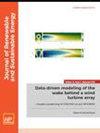Preliminary design and techno-economic assessment of a trigeneration system integrated with compressed air and chemical energy storage
IF 1.9
4区 工程技术
Q4 ENERGY & FUELS
引用次数: 0
Abstract
The advantages of compressed air energy storage (CAES) have been demonstrated by the trigeneration system with the characteristic of high penetration of renewable energy. However, since the irreversible loss of compression heat occurs during the overall operation processes of CAES, the development of CAES with high energy efficiency has been hindered by the conventional conversion pathway of compression heat. Therefore, a trigeneration system integrated with compressed air and chemical energy storage is proposed in this study to improve energy utilization efficiency. The compression heat is converted into H2 and CO via the endothermic methanol decomposition reaction to improve its energy level during the charging process, and then the syngas production can be used for air preheating during the discharging process. The parametric analysis is first performed to investigate the technical and economic feasibility of the system. Subsequently, the multi-objective optimization is conducted to identify the tradeoffs in the thermo-economic performance of the system and acquire the optimal values of operating parameters. Notably, the proposed system with a computed exergy efficiency of 43.31% and levelized cost of energy (LCOE) of 97.53 $/MWh is selected as the most compromise solution by the decision maker of Technique for Order Preference by Similarity to an Ideal Solution among the Pareto optimum fronts, which are 8.47% higher than the exergy efficiency and 7.39 $/MWh lower than the LCOE under the design conditions.压缩空气与化学储能一体化三联产系统的初步设计与技术经济评价
具有可再生能源高渗透性的三联产系统展示了压缩空气储能(CAES)的优势。然而,由于压缩热的不可逆损失发生在CAES的整个运行过程中,传统的压缩热转换途径阻碍了具有高能效的CAES的发展。因此,本研究提出了一种集压缩空气和化学储能于一体的三联产系统,以提高能源利用效率。压缩热在加料过程中通过吸热的甲醇分解反应转化为H2和CO,以提高其能量水平,然后合成气生产可用于排放过程中的空气预热。首先进行参数分析,以研究该系统的技术和经济可行性。随后,进行多目标优化,以确定系统热经济性能的权衡,并获得运行参数的最优值。值得注意的是,所提出的系统具有43.31%的计算火用效率和97.53$/MWh的平准化能源成本(LCOE),被决策者选择为帕累托最优前沿中与理想解相似的订单偏好技术的最折衷解决方案,在设计条件下比火用效率高8.47%,比LCOE低7.39$/MWh。
本文章由计算机程序翻译,如有差异,请以英文原文为准。
求助全文
约1分钟内获得全文
求助全文
来源期刊

Journal of Renewable and Sustainable Energy
ENERGY & FUELS-ENERGY & FUELS
CiteScore
4.30
自引率
12.00%
发文量
122
审稿时长
4.2 months
期刊介绍:
The Journal of Renewable and Sustainable Energy (JRSE) is an interdisciplinary, peer-reviewed journal covering all areas of renewable and sustainable energy relevant to the physical science and engineering communities. The interdisciplinary approach of the publication ensures that the editors draw from researchers worldwide in a diverse range of fields.
Topics covered include:
Renewable energy economics and policy
Renewable energy resource assessment
Solar energy: photovoltaics, solar thermal energy, solar energy for fuels
Wind energy: wind farms, rotors and blades, on- and offshore wind conditions, aerodynamics, fluid dynamics
Bioenergy: biofuels, biomass conversion, artificial photosynthesis
Distributed energy generation: rooftop PV, distributed fuel cells, distributed wind, micro-hydrogen power generation
Power distribution & systems modeling: power electronics and controls, smart grid
Energy efficient buildings: smart windows, PV, wind, power management
Energy conversion: flexoelectric, piezoelectric, thermoelectric, other technologies
Energy storage: batteries, supercapacitors, hydrogen storage, other fuels
Fuel cells: proton exchange membrane cells, solid oxide cells, hybrid fuel cells, other
Marine and hydroelectric energy: dams, tides, waves, other
Transportation: alternative vehicle technologies, plug-in technologies, other
Geothermal energy
 求助内容:
求助内容: 应助结果提醒方式:
应助结果提醒方式:


